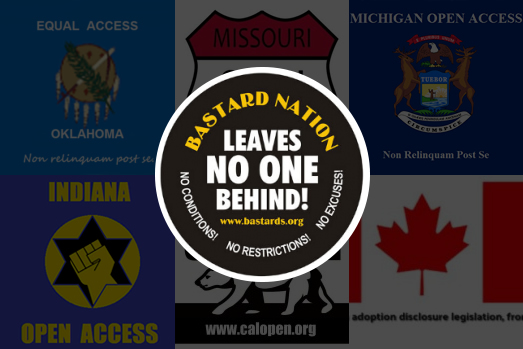XII. Open Records around the World
Sealed records are now the exception globally, and the trend is toward the repeal of anti-bastard laws. The United States and a handful of other countries are among the last holdouts to records reform.
The Anglo-Celt Countries:
Common Law countries, such as England and Australia, tend to have biases favoring “blood ties,” families and privacy. From the 1970s onward these biases have resulted in a trend toward open records. Previously, these same biases meant discrimination against bastards. In general, with the exception of Canada, records are open in these countries, subject to occasional vetoes.
The United States and Ireland share many of the same biases but have radically different adoption traditions that still retain sealed records. For example, the American system is founded on a complex combination of Imperial Roman Law and modern technocracy. This system gives state governments unique powers over families and has generated a vast quasi-private bureaucracy, both of which factors present impediments to openness. The United States, Canada, Ireland and a few others have activist adoptee groups.
Other First World Traditions:
Continental Europe, Quebec, Japan and Korea have divergent adoption customs using, for the most part, Civil Law traditions. Birth certificates and sometimes other adoption records are available to adoptees in most of these places, with Luxembourg and Quebec among the few exceptions. Scandinavians have some of the most progressive open records systems.
Adoptees report de facto impediments to accessing records in some countries despite having some legal rights to them. For instance, France, Quebec and Korea boast large numbers of foundlings and victims of the church- or state-sanctioned destruction of records. Adoptee activism focuses on breaking down the stigma of bastardy and removal of de facto barriers to openness. In France Les X en Colore, “The Angry Xs,” are battling l’accouchement sous X, the anonymous birth law that was the precursor of the Safe Haven laws that swept the U.S. in the late 1990s and early 2000s. http://www.x-en-colere.org
Developing World:
Practices in the developing world vary widely. In most countries records were never explicitly sealed, with exceptions including China, India and Poland. Generally, focus has been around the care of unwanted children rather than adoptee rights.
In Argentina adoption and sealed records were used by past regimes to facilitate the kidnapping of infants and to coerce adoptions. Argentinean activists now play a significant role in promoting the concept of open records as a universal right. http://www.yendor.com/vanished
International Polity:
Countries have begun to develop a consensus about human rights. A number of key international agreements, such as the Convention on the Rights of the Child, recognize a right to identity. Other rights recognized include freedom from discrimination due to the circumstances of one’s birth and the freedom to know and celebrate one’s biological heritage. These agreements have given rise to the International Council on Social Welfare’s Adoption Guidelines. The Guidelines enshrine the concept of open records and ethical adoption practices and form an alternative “universal adoption act” increasingly popular throughout the world, although universally ignored in the United States. They may be found at: http://www.adoptionscentrum.se/guidelines/english.htm
American citizens do not have the right to appeal to international authorities for alleged violations of human rights. Moreover, the United States is the only sovereign country that refuses to ratify the Convention on the Rights of the Child. http://www.unicef.org/crc




